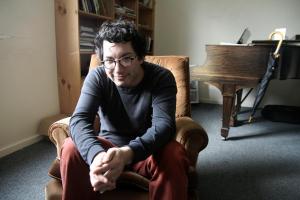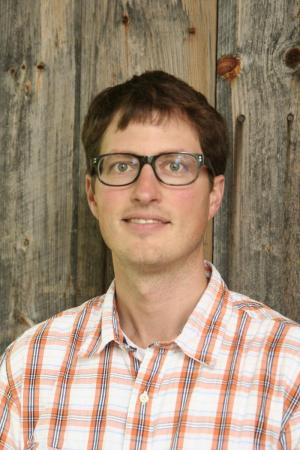
When Matan Rubinstein was commissioned by choreographer Peggy Choy to compose electronic music for a dance inspired by the haenyo diving women of Jeju Island, he was struck by how his perception of the haenyo’s culture differed from their own.
“I saw incredible beauty and nobility of human spirit in footage of the haenyo at work,” said Matan, Marlboro College’s new music professor. “They dive for mollusks without scuba gear and can spend a few minutes under water, swimming with this incredibly spare, economical grace.” In recorded interviews Matan used for his composition, however, the women spoke of their lives with a mixture of self-abasement and a sadness about the disappearance of the haenyo tradition.
“In both the footage I saw and in translations of recorded interviews I used in the pieces, the most common leitmotif, or recurring theme, took the form of complaints,” said Matan. “I tried to convey a sense of this disconnect in the pieces I created—a kind of disruption or unresolved tension.” Peggy Choy performed her choreography to Matan’s work, composed from the haenyo’s own words, rowing songs and other sounds, in Los Angeles and Berlin this fall.
Matan joined Marlboro’s music faculty in September, stepping into the large void left by longtime faculty member Luis Batlle. He brings with him a fresh and interdisciplinary perspective on music. Originally from Israel, he credits his eclectic approach to growing up in a culture where there was no rift between highbrow and lowbrow, composition and improvisation, acoustic and electronic music.
“I am interested in making sense of the connections between all these disparate elements, rather than basking in the sheer differences between them,” Matan said. “As I grow older, I feel increasingly compelled to find a ‘unified musical field’ of sorts. It feels a little silly saying this—it screams self-importance—but I won’t take it back.”
 Matan came to Marlboro after four years as a lecturer at the University of Wisconsin at Whitewater. He received his D.M.A. degree from the University of Wisconsin, Madison, where his dissertation piece was a composition for electronic sound and large chamber ensemble entitled Le Invisibili. This work, a modular piece comprising 35 musical segments that can be combined 27,300 ways, was the culmination of a decade of creating musical compositions that can be radically different with every performance.
Matan came to Marlboro after four years as a lecturer at the University of Wisconsin at Whitewater. He received his D.M.A. degree from the University of Wisconsin, Madison, where his dissertation piece was a composition for electronic sound and large chamber ensemble entitled Le Invisibili. This work, a modular piece comprising 35 musical segments that can be combined 27,300 ways, was the culmination of a decade of creating musical compositions that can be radically different with every performance.
Matan brings a wide range of talents and experiences to Marlboro and is a prolific composer of music that is diverse in practice, medium and method. He is a frequent collaborator with artists in other disciplines, and he often makes music for dance and film. Some recent examples include Palimpsest for trombone and “tape,” commissioned by trombonist Michael Dugan; Knotcracker, commissioned by the Li Chiao-Ping Dance Company; and the score for Verge, a dance film directed by Douglas Rosenber. Matan is an active performer, having founded both the Sada Jazz Trio and the Modular Music Ensemble, and has several recordings to his credit. He is also a passionate teacher with interests that span many disciplines.
“Teaching music is the best way I know of to prove the infinite ways in which people conceive of and hear music,” he said. “Every time I teach a piece of music, someone brings a distinctly different way of hearing it. I can never be bored with my vocation this way.”
Marlboro’s interdisciplinary approach similarly resonates with new writing professor Kyhl Lyndgaard. “When I saw the titles of recent Marlboro course offerings and student Plans, I was amazed at how diverse and vibrant the academics were,” said Kyhl, who also joined the community in September. “My initial pleasure in learning about Marlboro gave rise to a strong desire to be amidst those catalog listings. This was a chance to challenge disciplinary boundaries on a daily basis and join a community that is built around flexibility of inquiry.”
 Kyhl came to Marlboro from Luther College, in Iowa, where he spent a year as an Associated Colleges of the Midwest–Mellon postdoctoral fellow in English and environmental studies. He received his Ph.D. in English with an emphasis in literature and environment from the University of Nevada at Reno. His dissertation, titled “Landscape of Removal and Renewal: Cross-Cultural Resistance in 19th-Century American Captivity Narratives,” is currently under review by the University of Oklahoma Press. It examines a handful of subversive Indian captivity narratives published in the 1820s and 1830s that challenge Indian Relocation Act policies and depict the frontier wilderness as a domestic and inhabited space. Kyhl also co-edited an anthology entitled Currents of the Universal Being: Explorations in the Literature of Energy, which had its genesis in a student seminar, forthcoming from Texas Tech University Press. He has written many articles and chapters on literature, writing pedagogy and the natural world, as well as reviews, nonfiction and poetry.
Kyhl came to Marlboro from Luther College, in Iowa, where he spent a year as an Associated Colleges of the Midwest–Mellon postdoctoral fellow in English and environmental studies. He received his Ph.D. in English with an emphasis in literature and environment from the University of Nevada at Reno. His dissertation, titled “Landscape of Removal and Renewal: Cross-Cultural Resistance in 19th-Century American Captivity Narratives,” is currently under review by the University of Oklahoma Press. It examines a handful of subversive Indian captivity narratives published in the 1820s and 1830s that challenge Indian Relocation Act policies and depict the frontier wilderness as a domestic and inhabited space. Kyhl also co-edited an anthology entitled Currents of the Universal Being: Explorations in the Literature of Energy, which had its genesis in a student seminar, forthcoming from Texas Tech University Press. He has written many articles and chapters on literature, writing pedagogy and the natural world, as well as reviews, nonfiction and poetry.
“An essay I’m planning to read at a conference in Alaska next summer will somehow combine Hurricane Irene, Thoreau’s Maine Woods, climate change and ideas of freedom and community in early and present-day America,” said Kyhl. “This list of topics suggests that Marlboro’s interdisciplinary approach to academics has influenced me already.”
Kyhl believes that good writing depends on confidence and the freedom to speak your own mind, and he creates a classroom environment that fosters a sense of personal responsibility
“Individuality in thought and expression is all too rare and undervalued these days, and I can’t imagine working anywhere but a small liberal arts college,” he said. “Marlboro’s small size is a real asset in forging the sorts of alliances and creative solutions needed to offer flexibility in student tutorials and Plans.”
Kyhl’s choices in course readings often emphasize literature that has inspired action. Dan Phillippon’s Conserving Words, for example, traces how nature writers have directly influenced the creation of environmental groups, as in the case of John Muir and the Sierra Club or Mabel Osgood Wright and the Audubon Society. “Teaching literature that has had direct and often measurable influences on policy and public attitudes shows students the power of language,” Kyhl said.
Both Kyhl and Matan are already active participants in the Marlboro community. Matan jumped immediately into participating in Town Meeting, giving the traditional annual plea for driving carefully on South Road, and played Copland and Gershwin processionals for Convocation. Kyhl led a group of students to do hurricane relief work for Marlboro residents on Augur Hole Road, and hit the go-ahead home run in the faculty-student softball game. The community welcomes these additions, and looks forward to their many and varied contributions to come.

